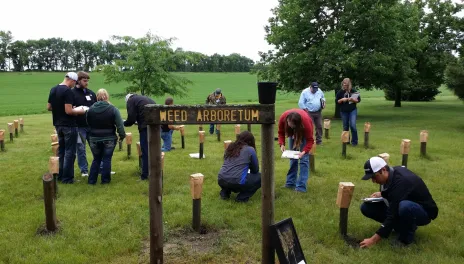Crop Management Field School scheduled for June 28
For a couple of weeks this winter, it looked like a staple of CREC summer programming was going to take a one-year hiatus while we were searching for a new Extension agronomist. Not to fear! Before taking the month of May away from the Carrington station, retired Extension Cropping Systems Specialist Greg Endres scheduled speakers and made all the other arrangements to carry on with this year’s Crop Management Field School when he returned, part-time, in June.
One of the first things on Greg’s list in early June was tending our Weed Arboretum. Curating 60-some weeds, each in their own labeled spot, is a feat in itself. Add in removing the rogue weeds that might complicate identification practices, and then making everything tidy, and it’s a huge task. Pictures of the Weed Arboretum at the end of May and one week later would have shown quite the before and after contrast! But it’s back to show quality now – come out and visit! All of the weeds have neat posts and ID tags. During Crop Management Field School and other summer events, though, numbered paper bags cover the tags so crop consultants, farmers, and other students can try their hand at weed identification.
This year’s Crop Management Field School is structured like other years. Fifty participants are accepted into the class, and that group is divided into two groups. In the morning, the first group walks across the parking lot to the Weed Arboretum, and the other group heads for an herbicide site-of-action demonstration plot. After the first cohort has had a chance to identify as many weeds as they can, Greg Endres and Griggs County Extension Agent Jeff Stachler will answer questions and discuss the ways that similar-looking weeds can be distinguished. Meanwhile, NDSU Extension Weed Specialist Joe Ikley will work with his group at the herbicide SOA site, experiencing first-hand the symptoms, clues, and evidence related to how herbicides affect weeds and other plants. After a short ride on our tour wagons, the teams will switch locations so everyone takes part in each session.
In the afternoon, NDSU Extension Plant Pathologist Andrew Friskop will lead a field class in small grain disease identification and management, including a review of current fungicides and their efficacy for control of wheat diseases, and NDSU Extension Soil Science Specialist Dave Franzen will take to the soil, and to plant nutrition, diagnosing crop nutrient deficiencies. Because of the small group size, everyone will have the opportunity to ask questions of the experts.
Registration is required, and 50 participants will be accepted on a first-come, first-served basis. Participants will receive reference materials, refreshments and a noon meal. Certified crop advisers will receive four continuing education units in crop pest and soil management.
For more details and registration information, visit ndsu.ag/field-school or contact the center at 701-652-2951. A completed registration form and $100 fee are required by June 23.
Linda Schuster
Linda.Schuster@ndsu.edu
Administrative Assistant
